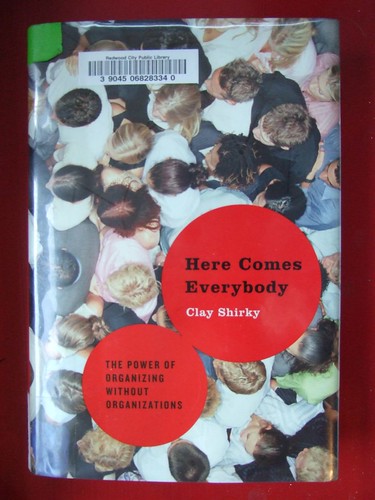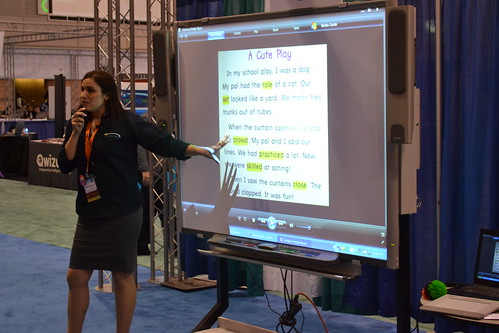Some cool high tech images:
Here Comes Everbody

Image by Earthworm
How high tech communication tools have changed the way people organize themselves and what it allows them to do. This book was recommended to me in the wake of discussion of Malcolm Gladwell’s essay dismissing social networking as a tool of social organizing because he claimed it generates only week tie connections and doesn’t persuade people to take costly actions. For those interested in defending the power of new technology to organize social change or behavior change, Shirky makes the following points.
Everyone can now be a publisher whereas before editors served to filter the news that was published and were able to limit topics and shape news (usually according to a societally agreed on bias). This factor alone upset the applecart of traditional news media, rendering the entire industry of printed news media irrelevant and they didn’t even see it coming (because they believed in the sanctity of the professional and didn’t take amateurs seriously).
Shirky summons the Power Law to describe the inequity of participation that characterizes the creation of content on the internet. You’d think that with tools that made participation so easy, there would be more equality in participation, but what happens is that only a few participate hugely, but the majority participate very minimally. This is important because when the many can participate equally they will help protect what the few are busy creating out of love for the many (and ego and for brain exercise). And that which they protect becomes a commons.
Wickipedia for instance. Only a handful of people might create the bulk of an article, but many more people help to make corrections thus increasing the value of the article over time and even more people than that read the articles thus making it worthwhile for the worker bees to guard their work. Thus there are plenty of eyes on the "street" to protect it from vandalism. It is not however exactly a collaboration, but more of a collaborative argument in which points are fought for and tolerated.
Wickipedia not only covers the usual academic topics it is also the go to place for unfolding world events such as the Madrid bombings because so many people can contribute bits of news making it more difficult for authoritarian states to control information, providing, of course, the interested party of the population has internet access.
This same collaborative effort also comes together for building tools like Linux. Here he talks about how the low cost of the web allows collaborators to fail faster because so little at stake. And so much to gain. Opensource collaborations means things can come to fruition faster and cheaper by marshaling the help of thousands motivated by shared interest in an outcome. But the invitation has to be right; it must provide a promise—why do this, a tool—to easily manage the group, and a bargain that rewards the participants.
The Power Law also describes the kind of conversations going on on the web. Bloggers with very large followings cannot respond to each of their commentators so are equivalent to broadcasting networks, but small audience bloggers can host conversations and respond to commentators, helping everyone to educate and inform everyone else. This is where most of us on flickr and blogger come in. The smaller the audience, the more every commentator also becomes a content provider.
Because our problem is now too much information, our job is to filter the input. "Filter then publish" gave way to "publish then filter". This aspect allowed small minority groups to be heard even though only a small audience was interested. Two things are made possible. Some far flung undesirable thinkers could now marshall an audience and persuade others to join and act i.e. Neo-nazis, bomb making terrorists, suicide advocates, bulimics and Tea Party supporters.
On the other hand a single person can alert others to an undesirable event, until so many people become concerned that it has to be addressed by larger news media or authorities. And once addressed then a backlog of previously blogged stuff can come to light on the bigger stage of television.
As for creating political movements and actions, Shirky provides a useful observation of social awareness. "when everybody knows something, when everybody knows that everybody knows, and when everybody knows that everybody knows that everybody knows". First you as an individual realize something is wrong or corrupt and change how you do things. Then you realize that everyone else realizes this and are taking action that is being seen. When everyone is realizing this same thing and everyone knows that we all realize it, then we have a movement. Thus the importance of the means of communication. For Leipzig and the collapse of the East German government this "information cascade" brought 400,000 people into the street, but it took 40 years of discontent. Leipzig protestors did not have cell phones or internet; their street protests were visible to authorities as they were building up and invisible to each other because of controlled media coverage. Authorities learned to stop small protests and nip in the bud a major protest.
Now we have flash mobs originally created by cell phones. Authorities cannot see a protest coming and when they get there they cannot control the way the event is broadcast to the world and they don’t want to look bad so police are less likely to crack unarmed people over the head. We now have the power both to create movements quickly and record them so that the movement has a record of its history and grows with the addition of copycat events. 350.org is such a movement. Shirky declines to comment on what we might do with these tools of collective assembly.
What I took away from this book was the importance of getting to "everybody knows that everybody knows that everybody knows". This is what social networking is good for. I’m not sure it will put feet on the ground when it counts, but it can change how we think about community and numbers of people it is possible to organize. For instance, the Tree People in Los Angeles getting trees planted in a day with 3,000 people probably would not have been so easy without e-mail. And it was a very different approach than using the usual government process taking 10 years and million of tax payers’ money.
I also believe cultural changes in the way we live are being fostered right here on flickr and through other DIY channels like Instructables. When enough people change how they do things or decide to invent their own things, this too will be a political change on the economical level.
And finally, even though social networking isn’t used much by most of my network it is there when a crisis hits and then everybody is on it. It is the telephonovision of our time.
NJEA Convention 2011

Image by kjarrett
High Tech Hall
Poster un Commentaire